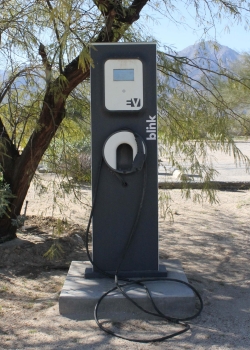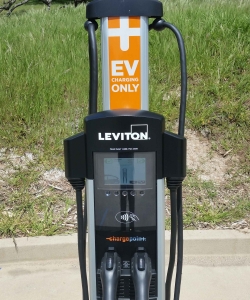Electric Vehicle Roadmap - Goal 2
Accelerate the installation of electric vehicle charging stations at public locations in County facilities and in the unincorporated county
Targeted Outcome
Contribute to the regional electric vehicle (EV) charging network by installing 2,040 Level II charging stations at County facilities and throughout the unincorporated area by 2028.
Overview

The County expands the regional EV charging network by installing charging infrastructure at public locations in County facilities and in the unincorporated county. By 2028, the County plans to install 2,040 Level II or equivalent charging stations at County facilities and in public locations in the unincorporated area. The County uses an EV charger site assessment to identify locations of high priority for charger installation to increase access to EV chargers and build a complete EV infrastructure network connecting our entire region.
To increase installation at County facilities, the EV Roadmap identified an amendment to Board Policy G-15 to require charging infrastructure for employee and public use in all new County facilities.
The County coordinates with regional partners to evaluate EV charging infrastructure gaps and identify opportunities for funding in the region.
The County conducts community engagement, particularly in
communities of concern, to garner public input on potential site
locations.
Accomplishments
 Level II charger at Santa Ysabel Nature Center
Level II charger at Santa Ysabel Nature Center
- Board policy amended in October 2019:
- Installed 113 publicly accessible EV chargers at County facilities and in the unincorporated area, with 19 newly added charging stations in 2024. The charging stations include 102 Level II chargers and 11 Direct Current Fast Chargers (DCFC) charging stations.
- Planning & Development Services (PDS) completed the Electric Vehicle Infrastructure Planning Analysis (EVI Planning Analysis) which provides a comprehensive assessment that helps in identifying priority locations for public EV charging stations in the unincorporated area and at County facilities.
- Incorporated EVI Planning Analysis findings and implementation steps into the 2024 Climate Action Plan to further increase access to EVs and charging stations.
Clean Mobility Options Voucher Pilot Program
In 2021, the County conducted a needs assessment to understand how residents in the La Presa neighborhood of Spring Valley travel within their community, and what transportation challenges they face when doing so. The County worked in partnership with residents to identify clean transportation options for the community. Learn more about the La Presa community transportation needs assessment.



